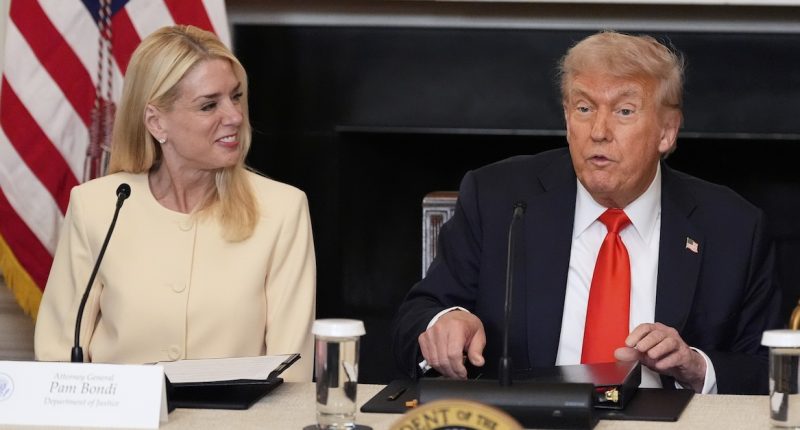Share this @internewscast.com
President Donald Trump addresses attendees as Attorney General Pam Bondi listens during a gathering with the Fraternal Order of Police in the State Dining Room of the White House on Thursday, June 5, 2025, in Washington (AP Photo/Alex Brandon).
The American Bar Association (ABA) is opposing the Trump administration’s initiative to exclude them from the process of assessing the president’s federal judicial nominees, a role they have played for over 70 years.
In a detailed seven-page letter to U.S. Attorney General Pam Bondi, ABA President William R. Bay expressed the organization’s shock and disappointment with the Justice Department’s move to restrict the ABA Standing Committee on the Federal Judiciary from evaluating nominees. He stressed that this change would lead to “less transparency” in the process of confirming individuals to permanent positions.
“It is deeply disturbing that the Justice Department has decided to restrict access to judicial nominees without justification or basis,” the letter states. “The Standing Committee’s impartial peer evaluations are unique and have consistently provided a significant source of information considered by senators from both parties that is not otherwise available during the confirmation process.”
The Standing Committee is a 15-person panel that evaluates the professional qualifications for nominees to U.S. District Courts, circuit courts, the Court of International Trade, and the Supreme Court. The committee’s stated goal is to “support and encourage the selection of the best-qualified persons for the federal judiciary.” Each member is appointed by the ABA president and serve terms of three years.
Love true crime? Sign up for our newsletter, The Law&Crime Docket, to get the latest real-life crime stories delivered right to your inbox.
Bondi on May 29 sent the ABA a letter stating that while the organization had previously received “special treatment” and been given “special access to judicial nominees,” those privileges were ending. The reason, according to Bondi, was that the ABA “no longer functions as a fair arbiter of nominees’ qualifications” and its ratings had “invariably and demonstrably” been favoring individuals nominated by Democratic administrations over Republicans.
“The ABA’s steadfast refusal to fix the bias in its ratings process, despite criticism from Congress, the Administration, and the academy, is disquieting,” Bondi wrote.
Eliminating the ABA from the nominee evaluation process marks an escalation in the administration’s attacks on the legal organization after previously threatening to revoke its status as a federally recognized accreditor of law schools. In turn, the ABA has criticized the administration for its personal attacks on federal judges and participated in litigation challenging Donald Trump’s executive orders targeting law firms he deemed to be representing or employing his political enemies.
In response, Bay wrote that Bondi’s decision appeared to be “based on incorrect information” and implored the attorney general to reconsider, claiming that no other organization does “the type of in-depth, independent evaluation” that the ABA had been doing for decades.
“The data does not support your claim of bias in the ratings process, or that the Standing Committee is not a fair arbiter of a nominee’s qualifications,” Bay wrote. “The Standing Committee has issued Well Qualified or Qualified ratings to no less than 96.9% of the rated nominees in each administration during the last two decades. This includes the first Trump administration. The Standing Committee rated all three of President Trump’s nominees to the U.S. Supreme Court as Well Qualified.”
He concluded by stating that the Selection Committee’s work doesn’t only assist senators with their decisions about nominees, it also helps to “bolster the public’s trust and confidence in our federal courts.”















